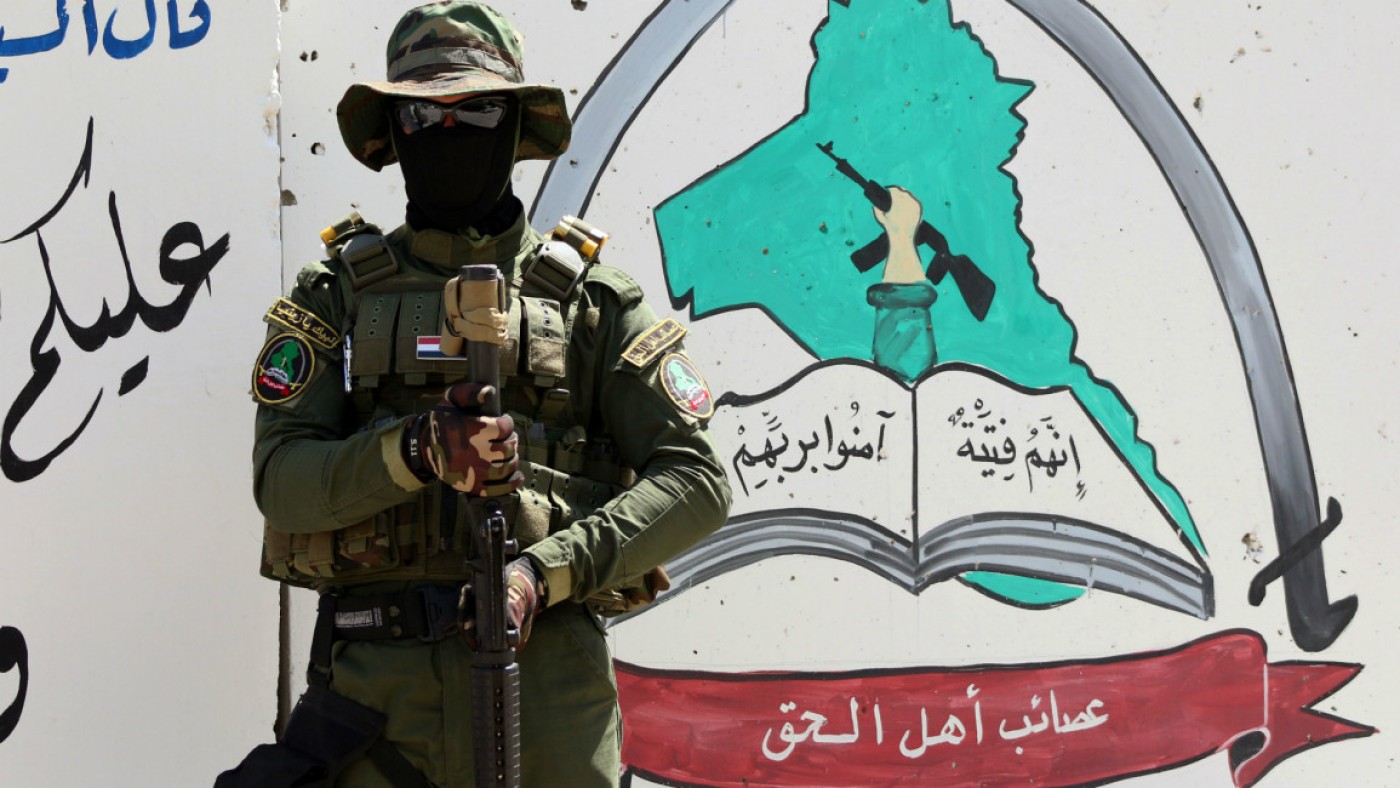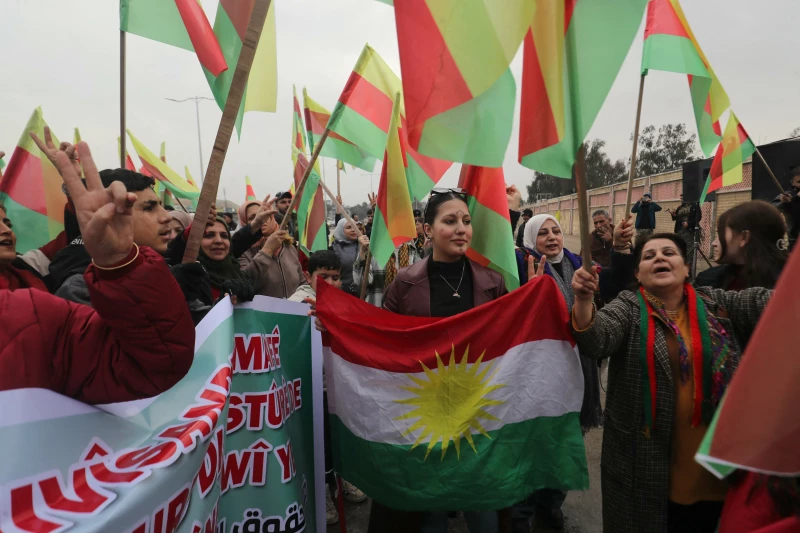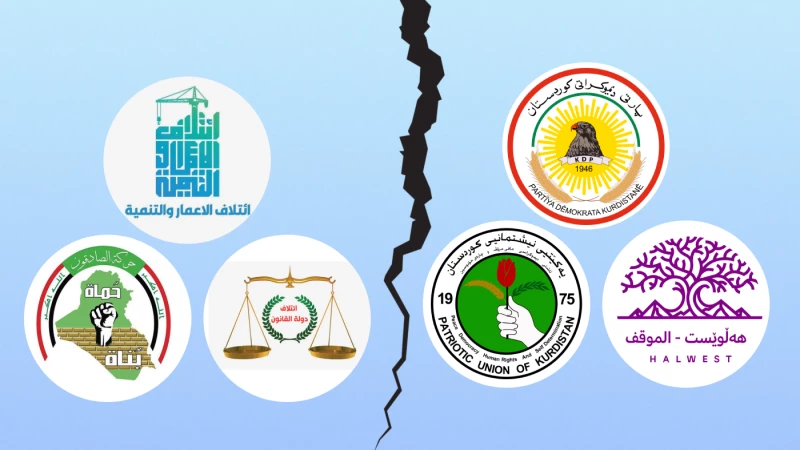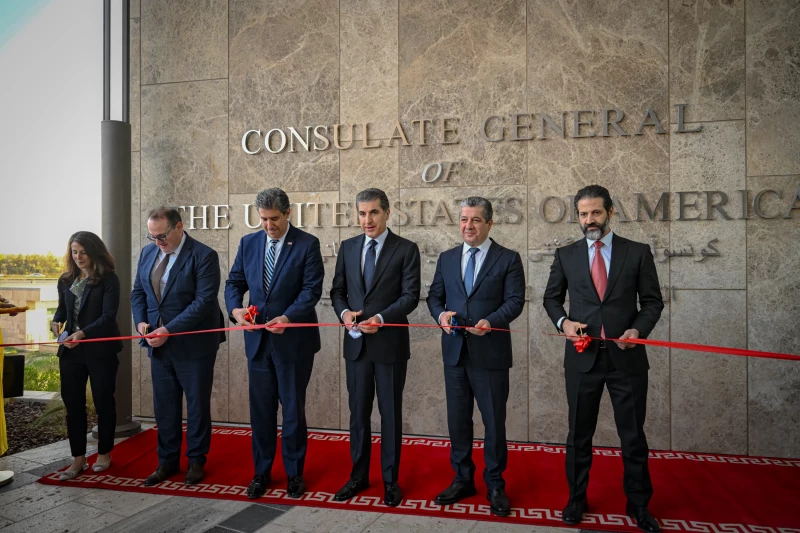Iranian-backed armed factions in Iraq have in recent years consolidated their presence within the Iraqi political system and taken on significant power at the political level.
Following Iraq’s victory against the Islamic State (ISIS) in December 2017, Iran-backed armed factions have taken on more roles within the political, economic, cultural, and security sectors.
These factions inherited both the advantages and the wealth that ISIS had gained during the years it controlled vast swathes of Iraq. In the past six years, they have imposed their authority on governance and administration as well as the distribution of jobs, wealth, projects and services.
Their influence on the Iraqi government’s positions on Israel’s ongoing war on Gaza is also clear.
Successes and meetings with US ambassador
Many of the transformations that Iraq went through in the post-ISIS period led to the rise of these armed factions within the political system. Their success in putting down the massive protests that spread across southern and central Iraq starting in October 2019 was one step on this road.
Then, their forcing influential Shia cleric Muqtada al-Sadr to withdraw from the political process in August 2022 despite the victory of his Sadrist movement in the October 2021 parliamentary elections was another.
This enabled what is known as the Coordination Framework (CF) - a political alliance that includes most of the Shia political forces loyal to Iran in Iraq - to form the government under Mohammad Shia al-Sudani in October 2022, a full year after the elections.
Through their presence within the Sudani government, these factions have reshaped their role within the political system by creating public relations channels facilitating the exercise of power.
And, more importantly, they have succeeded in taming the United States in Iraq through not threatening American interests in exchange for supporting the Iraqi government in power.
Notably, US ambassador to Iraq Alina Romanowski has taken part in no fewer than 43 meetings with CF leaders and top-level figures since the Sudani government was formed.
Ministries and security positions galore
After their success in forming the Sudani government, the armed factions focused on seizing power through various means. This process had begun during the government of former prime minister Adel Abdul-Mahdi (2018-2019) with support and pressure from former Iranian Quds Force commander Qassem Soleimani and Popular Mobilization Forces (PMF) commander Abu Mahdi Al-Muhandis.
Since the Sudani government took office in October 2022, the armed factions have gained control over many parts of the country’s leadership positions including the interior, oil, finance, electricity, health, higher education, agriculture, transportation and communications, labor and social affairs, sports and youth, water resources, and communications ministries.
As concerns security and defense institutions, the factions have managed to fill many of the top positions with figures known to be loyal to them within the defense and interior ministries as well as the country’s various intelligence services.
These include positions within the military office of the prime minister and the military intelligence directorate of the defense ministry, as well as the undersecretary of the interior ministry for intelligence affairs, the director general of intelligence and counterterrorism at the interior ministry (Falcon Cell Intelligence), the director of the intelligence and security department of Baghdad Operations Command, and the director of operations within the Iraqi National Intelligence Service.
Branching out into foreign offices and affairs
The CF has also had a major influence in appointing people within the foreign ministry in Baghdad and Iraqi embassies abroad.
Since the Sudani government was formed, there have been many new appointees to Iraqi embassies in such places as Moscow, London, and Washington DC. Despite the fact that these people were not directly affiliated with the CF, they were recommended by them.
The aim of this is to carry out a public relations campaign bringing together CF leaders and influential political leaders both inside and outside Iraq, sources say.
In a similar manner, Babylon Movement leader Rayan al-Kildani and Asaib Ahl al-Haq leader Qais al-Khazali have recently allegedly used intermediaries within the US Congress to try to get their names removed from the US designated terrorists list in exchange for supporting a US role in Iraq.
It is possible that the positions taken by Kildani and Khazali on the war in Gaza or even their positions on attacks on facilities hosting US military and diplomatic personnel in Iraq by Iran-linked Iraqi groups – whether by not expressing support for the attacks or by not attacking the US on account of its support for Israel in its war on Gaza - indicates the extent of the change.
Armed factions’ impact on Iraq’s position vis-a-vis Gaza
Despite good relations between the US administration under US president Joe Biden and the Sudani government, as evinced by the US’s reception of official Iraqi delegations and its neutralization of some paths of confrontation with Iran, the recent Gaza war has once again brought Iraq back into the fray in terms of tensions between the US and Iran.
This has been the case especially after many Iraqi armed factions within the Iran-led ‘Axis of Resistance’ announced their involvement in the Gaza war, claiming their attacks on sites housing US forces in Iraq and Syria are a response to US support for Israel in Gaza.
The Sudani government displayed US influence by demanding these attacks stop despite Iran’s desire that they continue. It has repeatedly also called for a diplomatic solution to the war while condemning Israel for its actions.
Although this Iraqi government position is echoed by other Arab nations and supported internationally, it clashes with the position of Iran-linked armed factions, which link their position on the war on Gaza with their position on the presence of US forces in Iraq.
This may have been what recently led to the emergence of a major dispute between CF forces and some armed factions, against the backdrop of November 8 attacks launched by cells affiliated with Harakat Hezbollah al-Nujaba (HHN) on the US embassy in response to an attack on a PMF base in Kirkuk the previous week that had killed 5 HHN fighters.
CF forces issued a statement expressing their condemnation of the attacks. This marks the first time that they have condemned any attacks carried out by ‘shadow cells’ affiliated with Iran-backed armed factions.
They then went further, announcing their support for the government’s measures to arrest those behind the attacks and to fully enforce the law against any armed group that attacks diplomatic missions in the country.
The statement by the CF forces unquestionably shows the depth of the dispute.
Essentially it is a conflict of views between HHN and Kataib Hezbollah, on the one hand, and Asaib Ahl al-Haq and the Badr Organisation on the other.
Possibly this disagreement is also due to the role that Iran played in Iraq in the recent period by bringing some factions closer and distancing others.
In one televised interview, Khazali expressed his dissatisfaction with the continued attacks on US sites in Iraq, considering them to be futile and stressing the need for political rather than military engagement with the US presence in Iraq.
Major repercussions on Iraq expected
Any action taken by the armed factions within the framework of expanding the ongoing war in Gaza will unquestionably have major repercussions on Iraq.
At the domestic level, some of these repercussions will likely be:
1. This participation may endanger the position of the Sudani government, given repeated US warnings, as well as lead to a more serious reaction from Israel than expected. This may lead to the Gaza war spilling over into Iraqi territory in various ways, impacting the future of the current government.
2. The US may tighten economic and financial sanctions on Iraq by banning more Iraqi banks linked to armed factions in order to further limit their access to the US dollar.
3. Any expansion of Iran-linked armed factions’ participation in the Gaza war may lead to a reconsideration of the nature of the security agreement binding Iraq to the US, as well as possible changes to the role of the US-led international anti-ISIS coalition.
At the regional level:
1. The involvement of Iran-linked armed factions in a large-scale regional conflict within the principle of a “unity of arenas” governing the Axis of Resistance’s strategy may reflect negatively on the security situation of Iraq’s neighboring countries, especifically Gulf States and Jordan, which may find them themselves targeted militarily. The group calling itself the Islamic Resistance in Iraq has recently targeted several sites in Iraq and Syria and on the Jordanian border.
2. Giving the war a regional character has disastrous consequences that may affect not only the interests of US partners but also expand the conflict from Gaza to other theaters in which Iran-linked armed factions may play an influential role.
3. Any role that the armed factions play in this war may push other Arab nations to shift their positions on the Sudani government since the factions’ choice of using armed methods may hinder political solutions that Arab diplomatic offices – especially Jordan and Egypt – are focusing on.
4. The most significant repercussion may be an impact on energy supplies and oil prices as well as the Development Road project that Turkey and Iraq have been trying to establish, which will face greater security challenges hindering its implementation on the ground.
At the international level:
1. The international support that Israel has received played an important role in shaping the position of Iran and its allies on the war in Gaza. The involvement of armed factions in the war may reshape international positions as well but potentially in a more extreme manner.
2. Leaders of Iran-linked armed factions have recently tried to re-market their image at the international level, particularly through positive relations that some have cultivated with the US ambassador in Iraq. Their participation in the war may put an end to these efforts.
3. Armed factions intent on expanding the war may push the international community to reassess the situation in Iraq at the political, security and economic levels. Political isolation of the country may result.
Iraq’s damage control
The Sudani government is aware of the serious repercussions that may result from the ongoing escalation carried out by Iranian-backed armed factions against US targets in Iraq and Syria.
This seems to have been confirmed by secret visits made by Iraqi diplomats to Tehran. The diplomats allegedly conveyed to Iran stern messages from other countries in the region concerning questions about Tehran’s “rules of engagement in the region” and how they “will deal with their allies if they actually begin launching attacks on Western interests”.
Sudani’s government undoubtedly has more than one way to moderate the behavior of Iran-linked armed groups in Iraq without needing to clash directly with them. One is making the leaders of the armed factions understand that they are in a good position in Iraq – politically, economically, and security-wise – and that their involvement in the Gaza war may destroy gains including those resulting from Sadr’s withdrawal from politics and his boycott of the December 18 vote, depending on the extent of the US reaction.
The government is also still trying to get waivers from the US administration for energy imports from Iran. The last waiver was issued in mid-November for a period of 120 days despite economic sanctions. These waivers are seen as a way to encourage the Sudani government to convince Iran to keep the Iran-linked Iraqi armed factions under control.
Its insistence on holding provincial council elections as scheduled without a much-discussed possible postponement was a significant step, as some leaders of armed factions tried to get them postponed.
Parallel paths and potential
The US administration’s failure to react forcefully to attacks carried out by Iran-linked armed factions may meanwhile encourage the Sudani government to continue with its policy of retaining a fragile balance within Iraq, or even to persuade the factions not to escalate further. This would explain their continued limiting themselves to only low-level attacks that do not push the US into responding.
Against this backdrop, the parallel path taken by the Iranian foreign ministry alongside that of the IRGC may encourage the Sudani government to convince Iran-linked armed factions not to focus exclusively on military means to reach their goals.
At present, the Iranian foreign ministry is trying to create a political path out of the war in Gaza. Foreign Minister Hossein Amir Abdollahian has been travelling throughout the region as part of this, potentially benefitting Iraqi armed factions without engaging in a war of attrition with the US; this may prove especially important if the Biden administration decides to impose sanctions on the Iraqi economy.
On the whole, the Sudani government finds itself in a very difficult situation. However, mitigating this, is the lack of a real desire on the part of Iran to get involved in the Gaza war as well as the fact that Iran-linked factions in Iraq are divided in their positions.
This may give the Sudani government a chance to exit the war with the least possible damage through efforts to prevent these factions from continuing to target sites hosting US forces in Iraq.
And it may very well succeed, given the desire of both Iran and the US to maintain the current de facto rules of engagement in the region for the time being.



 Facebook
Facebook
 LinkedIn
LinkedIn
 Telegram
Telegram
 X
X


